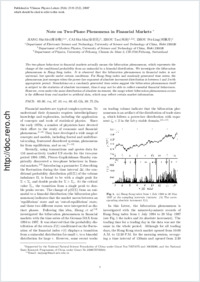Note on two-phase phenomena in financial markets
- Jiang, Shi-Mei Department of Electronic Science and Technology, University of Science and Technology of China, Hefei
- Cai, Shi-Min Department of Electronic Science and Technology, University of Science and Technology of China, Hefei
- Zhou, Tao Department of Electronic Science and Technology, University of Science and Technology of China, Hefei - Department of Modern Physics, University of Science and Technology of China, Hefei - Department of Physics, University of Fribourg, Switzerland
- Zhou, Pei-Ling Department of Electronic Science and Technology, University of Science and Technology of China, Hefei
-
2008
Published in:
- Chinese Physics Letters. - 2008, vol. 25, no. 6, p. 2319-2322
English
The two-phase behaviour in financial markets actually means the bifurcation phenomenon, which represents the change of the conditional probability from an unimodal to a bimodal distribution. We investigate the bifurcation phenomenon in Hang–Seng index. It is observed that the bifurcation phenomenon in financial index is not universal, but specific under certain conditions. For Hang–Seng index and randomly generated time series, the phenomenon just emerges when the power-law exponent of absolute increment distribution is between 1 and 2 with appropriate period. Simulations on a randomly generated time series suggest the bifurcation phenomenon itself is subject to the statistics of absolute increment, thus it may not be able to reflect essential financial behaviours. However, even under the same distribution of absolute increment, the range where bifurcation phenomenon occurs is far different from real market to artificial data, which may reflect certain market information.
- Faculty
- Faculté des sciences et de médecine
- Department
- Département de Physique
- Language
-
- English
- Classification
- Physics
- License
- License undefined
- Identifiers
-
- RERO DOC 9695
- DOI 10.1088/0256-307X/25/6/108
- Persistent URL
- https://folia.unifr.ch/unifr/documents/300789
Statistics
Document views: 91
File downloads:
- zhou_ntp.pdf: 125
